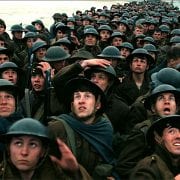Dunkirk: A Movie Review
Fewer events in modern history have captured the public interest and imagination as utterly as the battles and machinations of the Second World War. The source of countless films, novels and other dramatic retellings, cultural depictions often focus on hard won victories and uphill struggles against the Axis powers. In Christopher Nolan’s newest film Dunkirk we see a rarer, yet incredibly powerful, glimpse into an event that holds more ambiguous ground in the annals of history.
Opening on Nazi pamphlets fluttering down from an overcast sky, the story of Dunkirk begins as Nolan slowly brings the viewer into a tension-wrought film that proves to be as harrowing as it is compelling. Alternating between the perspective of a rank-and-file British soldier, Royal Air Force pilots, the civilian rescue fleet and at brief intervals, the commanders present, the audience can palpably feel the terror from every perspective.
The Battle of Dunkirk, alternately referred to as Operation Dynamo or the Miracle of Dunkirk, unfolded in May and June of 1940 in the small coastal French town of the same name. Surrounded by quickly advancing German troops and an incoming Luftwaffe (the German air force) over 400,000 soldiers, primarily British, became stranded once the totality of the enveloping German army became clear. The aforementioned pamphlets informed soldiers on the beach “WE SURROUND YOU” with arrows indicating the German position. Dunkirk captures the following battle, evacuation and activation of the British civilian vessel fleet that was sent to assist in the effort.
Dunkirk’s greatest strength is its ability to successfully flaunt conventional war film tropes by focusing upon the visceral terror of the conflict rather than emotional and interpersonal drama. Throughout the film dialogue is sparse and direct, and we are given little insight into the personalities of the characters themselves. The film instead chooses to provide us with an anxiety inducing and brutal experience of survival in war. As the invasion proceeds we see the beaches of Dunkirk descend quickly into unrelenting chaos. Soldiers blindly trust and mistrust one another, rescue vessels are boarded only to be mercilessly bombed and abandoned while British command struggles to comprehend the calamity.
The tension escalates further as we follow a man captaining a small British fishing boat with his son and a boy from their hometown. The marked contrast between the calm of crossing of the Thames on the way to rescue and the frantic stranded soldiers comes to a heartbreaking crescendo as the vulnerable fishing boat slowly breaches the zone of combat. This pivotal intersection is captured by quick shots of the vast unforgiving sea and deliberately unsteady camerawork that serve to inextricably draw the audience in. It becomes difficult to imagine the true experience of events was much different.
The powerlessness and crippling fear omnipresent throughout is captured with a spine-tingling score that leaves the viewer on the edge of their seat. Coupled with contrasting panoramic shots of destruction at sea and claustrophobic vignettes of desperate and struggling soldiers, the camera takes us on an exhilarating ride. Calling to mind director Christopher Nolan’s Inception and The Dark Knight trilogy, Dunkirk delivers another sweeping and expansive epic that has proven to be just as successful at the box office.
A Nolan favorite, Tom Hardy stars as a stoic Royal Air Force captain executing precarious assaults to protect the beaches of Dunkirk from inside his miniscule cockpit. Harry Styles, making a surprisingly smooth leap from boy-band stardom to the silver screen, delivers an aggressive and yet undeniably talented performance as a low-level British soldier. Finally, British acting legends Kenneth Branagh and Mark Rylance round out the eclectic cast with characteristically complex performances. Branagh plays the hand wringing and desperate Commander Bolton who artfully exhibits a restrained compassion for the troops he desperately tries to rescue throughout the film. Rylance respectively showcases his skill portraying a fishing boat captain calmly eager to join the civilian rescue fleet that was deployed at the 11th hour.
Held aloft by its stunning cinematography, subtle and yet profound acting performances, and irresistibly tense score, Dunkirk has proven itself to quite possibly be the war film of the decade. Unique in its approach portraying the sober British military and the understated fear and panic of battle in the midst of overwhelming violence, we are treated to an unglamorous and gratingly tense masterpiece. Brutally honest and horrifyingly realistic, the film will leave you shaken and yet full of awe – and for this reason Dunkirk is undeniably worth the watch.
Author Lauren Hellendall has been the Membership Assistant at JWV since December 2016. She graduated from American University in 2014 with a BA in Environmental Studies and took many film studies courses while at university. Lauren loves working with veterans and is excited to have her first film review published in the Veteran.
Volume 71. Number 3. Fall 2017





Leave a Reply
Want to join the discussion?Feel free to contribute!